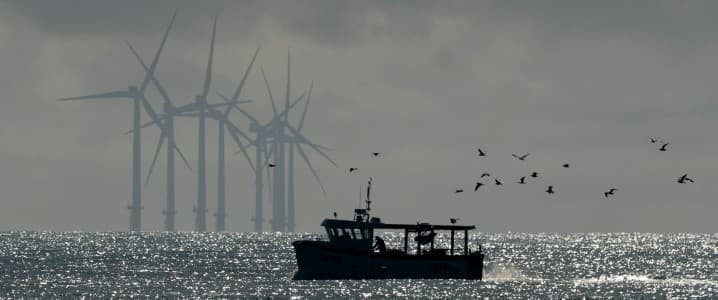
As the US aims to decouple from Chinese supply chains by doubling down on its domestic oil and gas resources, industries such as offshore wind have faced a barrage of economic challenges, from stop-work orders, to tax break rollbacks and rising inflationary costs. Despite unfavorable conditions in the US, Rystad Energy research shows new global offshore wind capacity will reach 16 gigawatts (GW) by the end of 2025 due to projects already underway, with two thirds of them being developed in China. By 2030, Rystad Energy forecasts China’s offshore wind projects will claim 45% of the world’s cumulative capacity, making it difficult for the US market to compete in the long term, regardless of policy reversals.
It is now clear that the energy policy shift in the US not only halts or slows progress on offshore wind projects that were previously greenlit but pushes European wind developers away from US investment. The US-China supply chain may be decoupled, but China’s position as a global renewables leader may have only been strengthened because of it.
Alexander Fløtre, senior vice president and head of offshore wind research, Rystad Energy
Learn more with Rystad Energy’s Offshore Wind Solution.
Some clear effects are already emerging. US renewable energy investments have plunged 36% year-on-year?so far in 2025, whereas European investments are rising as companies redirect capital away from the US. Stop work orders were issued for both Orsted’s Rhode Island offshore wind development and Equinor’s New York project, with the latter reaching a deal that lifted the administration’s ban. A federal judge has reversed the order on Orsted’s Revolution project, with the question of a continued legal battle waiting to be answered. To remain attractive to investors, Orsted and companies like it must evaluate all options for offshore wind developments and their overall US presence.
On the flipside, China-based CNOOC stated that it is staging its offshore wind portfolio expansion, with a key project in the 1.5 GW Hainan CZ7 aimed to be commissioned before 2030. The project is approved and is to be the first utility-scale project for CNOOC.?For European energy companies with less US exposure, their reliance on China and other nations will only be enhanced.
The chances of creating an alternate, renewables-driven supply chain to compete with China are low, with Western original equipment manufacturers (OEMs) flocking back to the country’s favorable business environment after fleeing in 2020. The challenge is formidable: an analysis of turbine platforms with IEC-type certification commonly used across Europe, for example, reveals that approximately 25% of the manufacturing sites producing key components for Western OEMs are in China.
Europe’s wind industry has taken notice, and policymakers are mobilizing to help reduce the reliance on Chinese imports and beef up the domestic wind energy supply chain. Officials hope such measures will encourage manufacturing buildouts while keeping costs in check.
Andrea Scassola, vice president of supply chain research at Rystad Energy
By Rystad Energy
More Top Reads From Oilprice.com
Kazakhstan to Raise Crude Oil Supply to Germany in 2026
IEA Slashes U.S. Renewables Growth Forecast Due to Trump Policies
EU Plans to Sanction Providers of False Flags to Russia’s Shadow Fleet